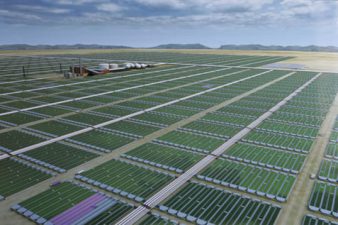 The idea that Brits love their tea is proving to be full of beans. The average Londoner drinks 2.3 cups of coffee a day, and the resultant spent coffee grounds end up in landfills which damage the environment, and – given the British landfill tax – is a costly means of waste disposal. Now those grinds are being put to use powering London’s iconic buses.
The idea that Brits love their tea is proving to be full of beans. The average Londoner drinks 2.3 cups of coffee a day, and the resultant spent coffee grounds end up in landfills which damage the environment, and – given the British landfill tax – is a costly means of waste disposal. Now those grinds are being put to use powering London’s iconic buses.
Overall, the UK produces 500,000 tonnes of waste coffee grounds every year, most destined for garbage dumps where it emits methane, a greenhouse gas that is 28 times more potent than carbon dioxide. Clean technology company bio-bean® is founded on the premise that there is no such thing as waste, just unexploited resources in the wrong place. With support from Royal Dutch Shell, they’ve industrialized the process of recycling spent coffee grounds into advanced biofuels and biochemicals.
Founded in 2013 by Arthur Kay (pictured above), bio-bean® manufactures a range of products from waste coffee grounds, saving businesses money, reducing greenhouse gas emissions, and displacing conventional fossil fuels. Their newest biofuel, which contains part coffee oil, is being added to the London bus fuel supply chain where it can be used without the need for modification, the companies said in a statement. Increasingly, Transport for London has been turning to biofuels to curb carbon emissions,trialling a fuel made with used cooking oil from the catering industry, the transport operator said on its website.
Bio-bean® and partner Argent Energy have so far produced enough coffee oil to power one bus for a year, if used as a pure-blend for the 20 percent bio component and mixed with mineral diesel to form a B20 fuel. They collect waste grounds from high street chains, transport hubs, and factories, which are dried and processed to extract coffee oil. “It’s a great example of what can be done when we start to reimagine waste as an untapped resource,” bio-bean® founder Arthur Kay told reporters.
Bio-bean® is the first company in the world to industrialize the process of recycling waste coffee grounds into advanced biofuels and biochemicals. Spent coffee grounds are highly calorific and contain valuable compounds, making them an ideal feedstock from which to produce clean fuels, such as the company’s Coffee Logs which provide an eco heat source for stoves, open fires and chimineas.
 Each Coffee Log is made from the grounds of 25 cups of coffee and contains about 20% more energy than wood – meaning it burns hotter and for longer. Coffee Logs are also 100% carbon neutral, diverting waste away from landfill and reducing harmful greenhouse gas emissions. These sustainable and high-performance products are fast displacing conventional fuels and chemicals.
Each Coffee Log is made from the grounds of 25 cups of coffee and contains about 20% more energy than wood – meaning it burns hotter and for longer. Coffee Logs are also 100% carbon neutral, diverting waste away from landfill and reducing harmful greenhouse gas emissions. These sustainable and high-performance products are fast displacing conventional fuels and chemicals.
Green Prophet once brought you 15 #LifeHacks using coffee grounds. We’ve written about coffee grinds being used to decontaminate toxic metals from water. And now we witness coffee waste being used for biofuel. But it was just last year that we reported that climate change was causing a worldwide shortage in coffee beans. Feeling jittery? It’s unlikely to be just from caffeine.
Images from © bio-bean limited



